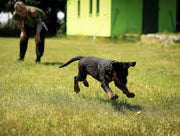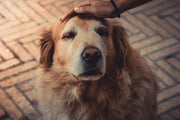
Itchiness comes in many forms: maybe your dog scratches his ears or licks his paws excessively. Or, it could simply be itchy skin on your dog's face. In general, check our article on dog ear mites and, more importantly, the benefits of salmon oil for allergies and itchy skin.
A dog itching face could have several root causes. If it only happens once, it is nothing to worry about. However, if you notice your dogs are rubbing their face repeatedly, you should look into the possible reasons behind this behavior.
Here are the main reasons why your dog is scratching his face

I will prioritize the most likely causes of dog itchiness, such as food allergy. You should still go through the list as maybe one reason will make sense to you. Some of these causes are often associated with other common signs such as:
- Allergic reaction
- Dog scratching other parts of his body
- Skin infections
- Dog licking his paws (excessive licking in general)
- Skin redness, skin problems
- Dog scratching his ears
- Ear infections (could be caused by ear mites)
- Inflamed skin
- Head shaking
- Hair loss
1. Your dog could have a food allergy
Did you know that beef was behind most dog food-related allergies? Read our list of the top 11 food allergens. While veterinarians claim that only 10% of dog allergies are caused by food, food alone has the most significant impact on your dog's health. Your dog may not be allergic to a particular ingredient, but he may have become intolerant to it.
Many dog owners who switched to the raw diet claim that their dog's health improved, and food allergies disappeared overnight. However, without changing your dog's diet, you can already look at what you feed your pup and try a new kibble or food without some of these common food allergens.
A very effective supplement you can give your dog for allergies is salmon oil for dogs. I recommend finding a Wild Alaskan Salmon or Wild Alaskan Pollock oil. They bring highly beneficial Omega-3 fatty acids to your dog's diet and are proven to support allergies.
We offer a Wild Alaskan Salmon Oil Formula with many reviews claiming it helped their dog overcome their allergies in as little as two weeks.
2. Environmental allergies and seasonal allergies
Are pollen, dust mites, or grass triggering your dog's allergies causing irritated skin? They are widespread triggers that could explain your dog's face rubbing behavior. Both food allergy and environmental allergy could present itchiness, and if you have ruled out food allergies, this is another common cause.
Once again, wild Alaskan Salmon Oil is a very effective supplement against environmental allergens. The main benefit is that it's something you can use right away without changing your dog's diet or having your vet prescribe medications.
3. Yeast infection or bacterial infections

Yeast infections and bacterial infections are known as secondary infections. They usually happen when your dog suffers from a root cause such as food allergies and has already undergone licking or scratching, thus causing a secondary infection.
If you notice your dog's skin is inflamed and swollen, you should consult your veterinarian so he can prescribe antibiotics to treat this infection.
4. Fleas, Mites, and Ticks
Could your dog have Demodex mites, sarcoptic mange, or traditional parasites like fleas and ticks? These external parasites typically bite your dog's skin and cause itchiness. Fleas and scabies usually cause itchiness all over your dog's body and not just on your dog's face. So if your dog is extremely itchy, it could be the reason.
On top of that, your dog could be allergic to flea saliva and flea bites. If you have noticed inflamed areas or hair loss, consider having your veterinarian inspect your dog's skin.
Fleas & ticks are common but easily prevented with monthly oral treatment. Please stay away from chemical flea & tick collars as they may cause more side effects.
5. Collar Irritation
Dogs rub their neck and face on other surfaces sometimes because their collar is causing discomfort. Make sure that his collar is not too tight: you should be able to slip two fingers underneath his collar.
6. Something On His Face
If your dog occasionally rubs his face, it may simply be because something on their face is bothering them, such as food, dirt, or moisture. Pet owners should not be concerned if that's the case. Also, check your dog's ear flaps to rule out ear infections.
7. Pain

Dog licking and rubbing is sometimes a way for your dog to ease the pain. Consult your veterinarian to rule out mouth, nose, and ear pain. Pet parents may sometimes miss this reason as it's not visible from the outside. Bad breath could be a sign of a dental problem or a bad tooth. Ear irritation could signify ear infections and why your dog rubs his face.
8. Brain Tumor
Brain tumors are rare, and this is a rare cause of why your dog would rub his face on other surfaces. However, the only way to rule this out is to ask your veterinarian.
9. Eye Irritation
Does your dog have itchy eyes? Check for any foreign material stuck in your dog's eyes or for a scratch or ulcer signs. Keep in mind that allergies could be causing dry eyes or itchy eyes, and explain why your dog is itchy on his face.
Some other reasons
Are you still wondering why your dog's face is itching? Let's look at a couple more reasons that could explain this behavior. All dog breeds are prone to itching, but you know your pet best and whether this is normal behavior or not. Most dogs will suffer from the occasional itch or paw licking, and it's nothing to worry about.
10. Something Smells Good

Dogs will sometimes try to rub something's smell on their face because they love it so much. So if your dog is rolling around in your yard, check for what could be the reason, if any!
11. Marking Territory
Depending on where your dog is rubbing his face, he could simply be marking his territory. Dogs can leave invisible pheromones behind with their paws, for instance.
12. It Feels Good
What object or type of fabric is your dog rubbing his face on? He could be enjoying the sensation.
13. Low Calcium Levels
One of the common symptoms of low calcium levels is facial itchiness. Seek veterinary attention, maybe a veterinary dermatology expert, to determine if that's your dog's case.
Final words
You have probably heard the term atopic dermatitis or allergic dermatitis before. Unfortunately, skin irritations are common in dogs, and it's sometimes hard to determine the exact cause. Other common environmental allergens can also trigger an itchy face, and affected dogs will rub their face multiple times a day to relieve the itch.
Sometimes, an easy ear cleaning can relieve dogs' itch. Other times, you may need to switch to a grain-free diet to solve your dog's dry skin issues.




